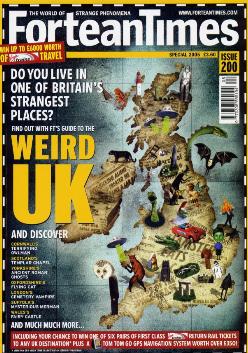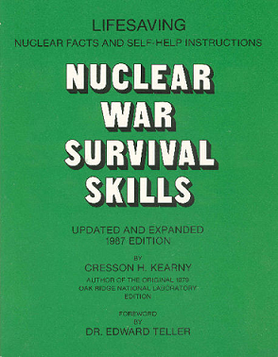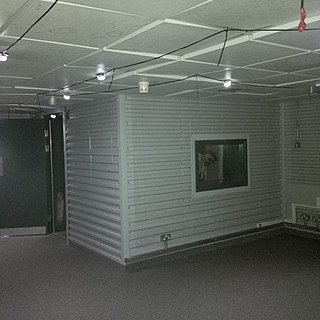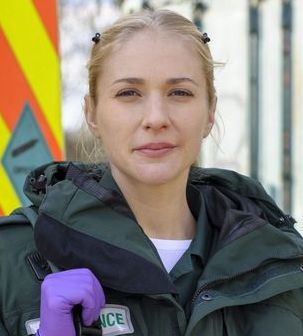
Threads is a 1984 British-Australian apocalyptic war drama television film jointly produced by the BBC, Nine Network and Western-World Television Inc. Written by Barry Hines and directed and produced by Mick Jackson, it is a dramatic account of nuclear war and its effects in Britain, specifically on the city of Sheffield in Northern England. The plot centres on two families as a confrontation between the United States and the Soviet Union erupts. As the nuclear exchange between NATO and the Warsaw Pact begins, the film depicts the medical, economic, social and environmental consequences of nuclear war.

Charles Hoy Fort was an American writer and researcher who specialized in anomalous phenomena. The terms "Fortean" and "Forteana" are sometimes used to characterize various such phenomena. Fort's books sold well and are still in print. His work continues to inspire admirers, who refer to themselves as "Forteans", and has influenced some aspects of science fiction.

Eric Frank Russell was a British writer best known for his science fiction novels and short stories. Much of his work was first published in the United States, in John W. Campbell's Astounding Science Fiction and other pulp magazines. Russell also wrote horror fiction for Weird Tales and non-fiction articles on Fortean topics. Up to 1955 several of his stories were published under pseudonyms, at least Duncan H. Munro and Niall(e) Wilde.

Protect and Survive was a public information campaign on civil defence. Produced by the British government between 1974 and 1980, it intended to advise the public on how to protect themselves during a nuclear attack. The campaign comprised a pamphlet, newspaper advertisements, radio broadcasts, and public information films. The series had originally been intended for distribution only in the event of dire national emergency, but provoked such intense public interest that the pamphlet was published, in slightly amended form, in 1980. Due to its controversial subject, and the nature of its publication, the cultural impact of Protect and Survive was greater and longer-lasting than most public information campaigns.

Fortean Times is a British monthly magazine devoted to the anomalous phenomena popularised by Charles Fort. Previously published by John Brown Publishing, I Feel Good Publishing, Dennis Publishing, and Exponent (2021), as of December 2021 it is published by Diamond Publishing, part of Metropolis International.

Iain Sinclair FRSL is a writer and filmmaker. Much of his work is rooted in London, recently within the influences of psychogeography.
A monograph is a specialist written work or exhibition on one subject or one aspect of a usually scholarly subject, often by a single author or artist. Although a monograph can be created by two or more individuals, its text remains a coherent whole and it keeps being an in-depth academic work that presents original research, analysis, and arguments. As a focused, in-depth and specialised written work in which one or more authors develop a uniform and continuous argument or analysis over the course of the book, a monograph is essentially different from an edited collection of articles. In an edited collection, a number of original and separate scholarly contributions by different authors are edited and compiled into one book by one or more academic editors.
Paul R.A. De Giberne Sieveking is a British journalist and former magazine editor.
Steve Moore was a British comics writer.

Dennis Publishing Ltd. was a British publisher. It was founded in 1973 by Felix Dennis. Its first publication was a kung-fu magazine. Most of its titles now belong to Future plc.
Donna J. Kossy is a US writer, zine publisher, and online used book dealer based in Portland, Oregon. Specializing in the history of "forgotten, discredited and extreme ideas", which she calls "crackpotology and kookology", she is better known for her books Kooks: A Guide to the Outer Limits of Human Belief and Strange Creations: Aberrant Ideas of Human Origins from Ancient Astronauts to Aquatic Apes (2001). Kossy was also the founder and curator of the Kooks Museum, and the editor-publisher of the magazine Book Happy.

Nuclear War Survival Skills or NWSS, by Cresson Kearny, is a civil defense manual. It contains information gleaned from research performed at Oak Ridge National Laboratory during the Cold War, as well as from Kearny's extensive jungle living and international travels.

RAF Barnham is a Royal Air Force station situated in the English county of Suffolk 2 miles (3.2 km) south of the Norfolk town of Thetford. It is located to the north of the village of Barnham on Thetford Heaths. The camp is a satellite station of RAF Honington.

Witherby Publishing Group, formerly known as Witherby Seamanship, is a technical publisher of maritime, nautical and navigation training, reference and regulatory materials. The company is the resulting merger of Witherby Books and Seamanship International in January 2008. Beginning with its origins in 1740 it lays claim to being the oldest independent publisher in the English-speaking world.

The Wartime Broadcasting Service is a service of the BBC that is intended to broadcast in the United Kingdom either after a nuclear attack or if conventional bombing destroyed regular BBC facilities in a conventional war. It is unclear if the Wartime Broadcasting Service is still operational as plans are kept mainly secretly with the BBC and government officials. According to an article by the BBC, recordings of a nuclear attack warning are still re-recorded and kept up to date periodically.

Royal Air Force Holmpton or more simply RAF Holmpton is a former Royal Air Force Cold War era nuclear bunker that was built in the 1950s as an early warning radar station as part of the ROTOR Radar Defence Programme. Located just south of the village of Holmpton, in the East Riding of Yorkshire, England, RAF Holmpton remained a part of the Defence Estate right up to 8 December 2014 when it was sold into private ownership after 62 years of military service.

Royal Air Force Shipton was a First World War era airfield located north of the village of Shipton-by-Beningbrough, in North Yorkshire, England. During the First World War, it was used by No. 76 Squadron RAF whose remit was to provide Home Defence (HD).
The Integrated Review of Security, Defence, Development and Foreign Policy, often known as the Integrated Review, and titled as Global Britain in a Competitive Age, was a review carried out by the British government led by Boris Johnson into the foreign, defence, security and international development policies of the United Kingdom. Described by Johnson as "the largest review of its kind since the Cold War", the review was published on 16 March 2021.
Ron Weighell was a British writer of fiction in the supernatural, fantasy and horror genre, whose work was published in the U.K., the U.S.A., Canada, Germany, Ireland, Romania, Finland, Belgium and Mexico. His stories were included in over fifty anthologies and published in six volumes containing his own work exclusively. Weighell is listed as an author in the online Bibliothèque Nationale de France, with a selected bibliography. A short biography and limited bibliography are available in the goodreads.com website. A more extensive bibliography of his published work is available in the Internet Speculative Fiction Database. Weighell died on 24 December 2020, some weeks after suffering a stroke. Obituaries have been published by the Fortean Times magazine, the newsletter of The Sherlock Holmes Society of London, and Locus Magazine.

Ruby Spark is a fictional character from the BBC medical drama Casualty, played by Maddy Hill. She first appears in the forty-first episode of series thirty-two, originally broadcast on 14 July 2018. The character and Hill's casting details were announced on 18 January 2018 and she began filming during the following month. For the role, the actress qualified as a Heavy Goods Vehicle (HGV) driver. Ruby is a paramedic and is characterised as a smart, caring and opinionated perfectionist who lacks social skills. Her near-photographic memory of procedures and medication serves as an important character point as she struggles to deviate from the rules. The character's backstory states that she has just graduated from university, adding to her over-emphasis on rules. Ruby is introduced as part of the show's increased focus on paramedics and producers wanted to explore the profession through the character.














